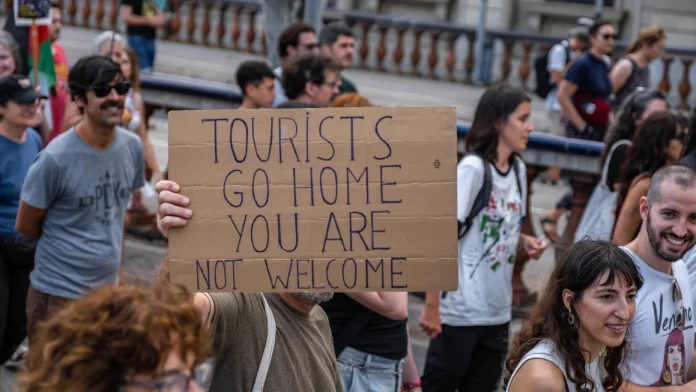A growing wave of tourism across Europe is causing unrest among locals who feel their neighbourhoods are drowning under the weight of too many visitors. Recent protests across Spain have highlighted the growing discontent with excessive tourism, as residents express concern about the impact on housing, the local economy and community life, The Pinnacle Gazette reports.
One of the cities at the forefront of this movement is San Sebastian, where demonstrators held a rally under the slogan “We are in danger; degrow tourism!” Locals expressed their concern about the situation and stressed that they could no longer accept holidaymakers. Under the banner of the civic group Bizilagunekin, which means “with neighbours” in Basque, the protests were the culmination of the “October against touristification,” a series of actions protesting against the priority of tourists over locals.
According to Amaia Oulad from Bizilagunekin, San Sebastian has simply reached its limit. She said:
“We are fighting since 2018, asking for tourism de-growth in our city.”
The impact of tourism, she also explained, is not limited to crowded streets; it affects housing affordability and the harsh labour conditions of local workers. Oulad painted a picture of neighbourhoods suffering from too many tourists. Highlighting how ordinary citizens are being pushed out of their neighbourhoods, she lamented:
“We can’t live in our town anymore, we have to go live elsewhere.”
San Sebastian is not alone. The wave of demonstrations echoes similar sentiments across major cities, with residents from other Spanish cities, including Madrid and the Canary Islands, joining in. The upsurge follows a recovery in tourism after the pandemic, with visitor numbers in many cities exceeding pre-virus levels, according to The Pinnacle Gazette.
Social and economic impacts of tourism
Such tensions are not unique to Spain – crowded cities and debates about over-tourism are widely felt in several popular European destinations. According to figures, Spain will welcome up to 90 million foreign tourists this year, and Braintrust predicts that by 2040 the number of tourists in the country will surpass France and reach 115 million. With these expectations, locals are increasingly worried about how this will affect their lifestyles and communities.
Tourism stress manifests itself not only in protests, but also in the practical actions of local authorities trying to keep the peace. For example, Seville’s city council has introduced rules limiting the number of flats for tourists to only 10 per cent of the accommodation on offer in all areas of the city. This strategy reflects concerns about rising rental prices and a housing shortage directly related to increased demand from tourists.
The urban fabric of cities such as San Sebastian is being eroded by tourism, and residents are feeling the social and economic consequences of prioritising the annual influx of tourists over the well-being of the community. The delicate balance between thriving tourism and preserving the integrity of local life is easier said than done when citizens are already struggling with the cost of living and housing insecurity, The Pinnacle Gazette reports.
Golden goose
While tourism brings economic benefits, making it a golden goose for some, residents demand accountability, demanding restrictions and regulations to protect their homes and livelihoods. They argue that the current tourism model is unsustainable and claim it is squeezing the life out of their neighbourhoods.
Back in San Sebastian, locals are not only clamouring for their city, but also for their way of life. They are calling for greater awareness, signalling to both their leaders and the tourism industry: communities must come first. Only by considering their needs can destination cities truly thrive.
The growing wave of protest movements across Europe demonstrates the complex relationship between tourism and everyday life. It’s not just about travelling, but also about the sustainability of communities and the quality of life of residents. The struggle to protect local interests from ever-expanding tourist traffic continues to shape the discourse around urban planning and community well-being.
